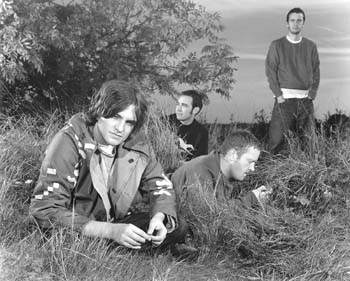![[Metroactive Music]](/music/gifs/music468.gif)
[ Music Index | Santa Cruz Week | SantaCruz Home | Archives ]
Starry Starry Night: Starsailor has crafted the perfect album for the end of affluence.
English Soul
Sincere Starsailor rises above sensitive Brits and gritty Yanks
By Michelle Goldberg
EVER SINCE ELVIS was upstaged by the Beatles, England and the United States have taken turns strutting and preening on rock's center stage. The transatlantic madness of punk at its height was an exception--usually, one country or the other dominates. Just think: What was the best mainstream British rock band of the grunge years? The best chart-busting American guitar act during the Britpop explosion?
Note I said mainstream, because, of course, plenty of British acts were cranking out amazing music in the early '90s, just as plenty of American bands rocked out while Blur ruled the charts. Indeed, I'd take Sleater-Kinney over Oasis any day, and would sure as hell rather listen to The The than to Pearl Jam. That's the point--whenever one country is in the foreground, the other starts to seem like a reaction against or an antidote to the hype.
Right now, thanks to the Strokes and the White Stripes, the U.S. is ascendant in the realm of crunching, grinding, amp-busting rock bravado. Good for us. But while American acts bask in the spotlight, the first great album of 2002 comes, naturally, from England. While the Strokes celebrate masculine abandon, Britain's doleful Starsailor offers songs of tortured beauty for the enervated and adrift.
The band's new album, Love Is Here, has already spurred a craze and a backlash in Britain, with critics opposing the sensitive "falsetto gang" of Travis, Coldplay and Starsailor against the aggressive cool of our Strokes and Stripes. This is an old dichotomy: the sensitive, literate Brits vs. the gritty, explosive Americans. Morrissey and Pulp couldn't have come from this country, and Iggy Pop couldn't have come from any other.
What's odd about the opposition this time around is that Starsailor is about as far as you can get from fey. Its influences are American (and Canadian)--people like Neil Young and Jeff Buckley (the name Starsailor comes from an album by Tim Buckley, Jeff's father). Perhaps more importantly, the group's music speaks with uncanny precision to our current mood of tense ennui and sudden loss, and to the forlorn hope of finding redemption amid the rubble. Love Is Here is the perfect album for the end of affluence.
Walsh's voice may be high, but it's far from twee or gentle. His is a taut, rough, quavering voice with reserves of passion that belie his 21 years. Similarly, the melodies, lovely as they are, tend to veer in surprising directions and resist the pat, hummable tunes of fellow falsetto gangsters Travis. Part of this is probably due to keyboardist Barry Westhead, a classically trained Miles Davis buff. On songs like "Fever" and "Talk Her Down," his bits of urbane jazz tinkling make a compelling counterpoint to Walsh's raw, wailing vocals.
Still, it's Walsh's voice that makes the album captivating. His aching, rising cry "Stay by my side / and the cynics won't get in our way" in the chorus of "Alcoholic" comes as a surprise given the minor-key lassitude of what comes before. There's no real hook, but "Alcoholic" grabs you anyway with its immediacy. The way the song gains momentum after the first verse also confounds cliché. It starts out like an unsurprising bit of folk-rock melancholia, only to hurl forward like a man moving from anomic depression to frenzied desperation.
The songs here hover in an uneasy space between desolation and hope. The people Walsh sings of on tracks like "Alcoholic" and "Way to Fall" are damaged or struggling, but the sympathy in his voice dignifies them. "Way to Fall," a failed father's warning to his son, recalls Pulp's "A Little Soul," but instead of using Jarvis Cocker's ironic pathos, Walsh completely identifies with and embodies his broken narrator.
The album's most immediately accessible single, "Good Souls," meanwhile, manages to be a sincere, anthem to, well, sincerity that's neither preachy nor maudlin. "Thank goodness for the good souls that make life better," Walsh sings, pulling off the sentiment through sheer infectious sweetness. With its chiming guitars, triumphant builds and plaintive conviction, the song recalls U2 when it was still an unpretentious combo from Dublin and Bono hadn't had wrap-around sunglasses surgically attached to his face.
Reports of the death of irony in the wake of Sept. 11 have been greatly exaggerated, but Starsailor's unaffected ardency still seems particularly welcome right now. Its members are not as pretty or as cool as our homegrown baby rock gods. But then, a lot of us aren't feeling so pretty or cool these days either. With the world so recently on fire and the money-drunk promises of the '90s all broken, I'm feeling deaf to Dionysean rhythms. I'm in the mood for Love Is Here.
Copyright © Metro Publishing Inc. Maintained by Boulevards New Media.
![]()

Christophe Rihet 2001
From the February 27-March 6, 2002 issue of Metro Santa Cruz.